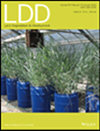Land Degradation & Development is an international journal which seeks to promote rational study of the recognition monitoring control and rehabilitation of degradation in terrestrial environments. The journal focuses on: what land degradation is; what causes land degradation; the impacts of land degradation the scale of land degradation; the history current status or future trends of land degradation; avoidance mitigation and control of land degradation; remedial actions to rehabilitate or restore degraded land; sustainable land management. Land degradation may be defined as the loss of utility or potential utility through the reduction of or damage to physical social cultural or economic features and/or reduction of ecosystem diversity. There may be a single cause or a complex mix of causes some may be biogeophysical ('natural') some socioeconomic ('human') and it is quite possible that cause(s) will be indirect perhaps cumulative and difficult to identify. A major challenge is to learn how interactions between development and environment can be better managed to increase prospects for ecologically and socially sustainable improvements to human well-being. Papers are invited on scientific social economic political and historical aspects of terrestrial environmental degradation. Also welcome are analyses presenting forecasts of trends case studies and discussion on management planning and policy-making relating to the promotion of ecological sustainability and the counteraction of land degradation. In addition to original research papers regional and thematic reviews both invited and submitted will be included as will short communications book reviews and applications of remote sensing and computer techniques. The members of the Editorial Board are drawn from a comprehensive range of disciplines and nationalities. Together with a strict refereeing procedure this will ensure Land Degradation & Development maintains a high standard and presents material from a wide range of disciplines from interdisciplinary study and with an international coverage.
